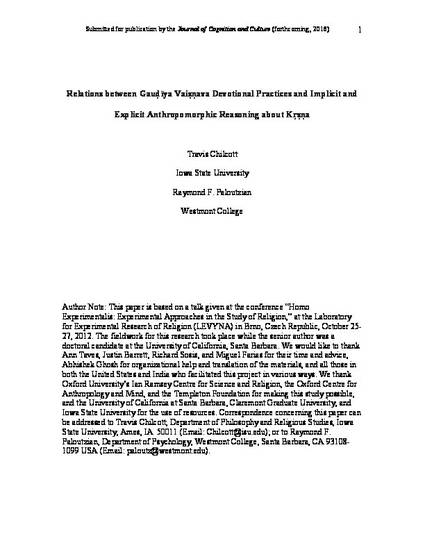
Article
Relations between Gauḍīya Vaiṣṇava Devotional Practices and Implicit and Explicit Anthropomorphic Reasoning about Kṛṣṇa
Journal of Cognition and Culture
Document Type
Article
Disciplines
Publication Version
Submitted Manuscript
Publication Date
1-1-2016
DOI
10.1163/15685373-12342170
Abstract
Employing a narrative comprehension task procedure, this study tests the hypothesis that engagement in Gauḍīya Vaiṣṇava religious practices, which are aimed at cultivating a personal relationship with the Hindu deity Kṛṣṇa, predict increased implicit attribution of anthropomorphic properties to him. Contrary to our hypothesis, multiple regression analyses of data from 184 native Krishna devotees in West Bengal, India, indicated that increased engagement in these practices loaded as a tertiary predictor after education and age, such that increased practice predicted a decrease in implicit anthropomorphic reasoning about Kṛṣṇa (ß = 0.16, p < 0.03). Based on these and additional analyses of the data, we theorize that these results may be due to the tradition’s emphasis on presenting Kṛṣṇa’s non-anthropomorphic dimensions to neophyte practitioners and the non-Gauḍīya Vaiṣṇava public. One implication of these results is that religious cultures and engagement in religious practices have the potential to significantly affect a human cognitive tendency to implicitly attribute anthropomorphic properties to divine beings. This may result from developing alternative knowledge from which to reason about a deity by engaging in religious practices and beliefs shaped by particular theological, historical, and cultural factors.
Employing a narrative comprehension task procedure, this study tests the hypothesis that engagement in Gauḍīya Vaiṣṇava religious practices, which are aimed at cultivating a personal relationship with the Hindu deity Kṛṣṇa, predict increased implicit attribution of anthropomorphic properties to him. Contrary to our hypothesis, multiple regression analyses of data from 184 native Krishna devotees in West Bengal, India, indicated that increased engagement in these practices loaded as a tertiary predictor after education and age, such that increased practice predicted a decrease in implicit anthropomorphic reasoning about Kṛṣṇa (ß = 0.16, p < 0.03). Based on these and additional analyses of the data, we theorize that these results may be due to the tradition’s emphasis on presenting Kṛṣṇa’s non-anthropomorphic dimensions to neophyte practitioners and the non-Gauḍīya Vaiṣṇava public. One implication of these results is that religious cultures and engagement in religious practices have the potential to significantly affect a human cognitive tendency to implicitly attribute anthropomorphic properties to divine beings. This may result from developing alternative knowledge from which to reason about a deity by engaging in religious practices and beliefs shaped by particular theological, historical, and cultural factors.
Copyright Owner
Brill
Copyright Date
2016
Language
en
File Format
application/pdf
Citation Information
Travis Chilcott. "Relations between Gauḍīya Vaiṣṇava Devotional Practices and Implicit and Explicit Anthropomorphic Reasoning about Kṛṣṇa" Journal of Cognition and Culture Vol. 16 Iss. 1-2 (2016) p. 107 - 121 Available at: http://works.bepress.com/travis-chilcott/2/

This is a manuscript of an article from Journal of Cognition and Culture 16 (2016): 107, doi:10.1163/15685373-12342170. Posted with permission.